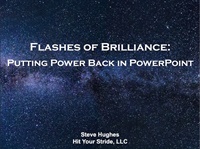
- Author:
- Lenné Espenschied, Esq.
- Publication Date:
- Apr 16, 2012
- Short Description:
- The Grammar and Writing Handbook shows you precisely which rules need to be followed, how to choose the correct words, and the most effective way to structure every sentence to help you compose more persuasive, stronger material that's flawlessly written. The book includes a brief history of the English language, as well as comprehensive information on every thing from singular vs. plural, to

- Faculty:
- Jennifer Ellis, Esq.
- Duration:
- 1:04
- Format:
- Audio and Video
- Short Description:
- Are you curious about how artificial intelligence can revolutionize the way your law firm operates? While there has been extensive theoretical discussion about AI, this seminar offers a unique opportunity to witness its practical applications firsthand. Join us for "A Day in the Life: Practical Examples of Artificial Intelligence in Law Firms," a continuing legal education seminar where

- Faculty:
- Daniel J. Siegel, Esq.
- Duration:
- 1 Hour 1 Minutes
- Format:
- Audio and Video
- Short Description:
- This program will highlight the newest features of Adobe Acrobat Pro while also demonstrating some of the features that make it a must-have for every law firm.

- Faculty:
- Roger J. Dodd, Esq.
- Duration:
- 1 Hour 30 Minutes
- Format:
- Audio and Video
- Short Description:
- In a series of four 90-minute webinars, Roger Dodd presents a completely integrated cross-examination system taught via learnable concrete principles. In each webinar Roger illustrates key principles and techniques of cross-examination to implement at trial and at depositions (in-person or online). His examples are based on dozens of real-life examples. Even if you don’t take the whole series...

- Faculty:
- Philip Bogdanoff, Esq.
- Duration:
- 1:00
- Format:
- Audio and Video
- Short Description:
- Hannah Gutierrez Reed, the armorer of the film “Rust” was found guilty of Involuntary Manslaughter for the 2021 on-set fatal shooting of cinematographer Halyna Hutchins. Alec Baldwin fired the fatal bullet believing that the gun was a cold gun and did not contain live ammunition. At Ms. Reed’s trial the prosecutor relied on visual evidence, film, pictures, and visual enhancements

- Faculty:
- Roger J. Dodd, Esq.
- Duration:
- 2:00
- Format:
- Audio and Video
- Short Description:
- To litigate in the COVID-19 era you need more than the traditional cross-examination techniques you’ve always relied on. COVID-19 has dramatically changed the face of litigation...kick-starting a technology shift in the practice of law that has already taken place in almost every other area of society. Zoom, Webex, and other remote platforms are now a regular part of the litigation and ...

- Author:
- Roger J. Dodd, Esq.
- Short Description:
- Since the last edition of the book published in 2017, the importance of depositions has increased substantially. As the subtitle of this book indicates - Your Depositions are Now Your Trials. Knowing how to cross-examine deponents is an absolutely essential skill for all litigators. Cross-examination for depositions gives you the tools you need to maximize your effectiveness at depositions.

- Faculty:
- Roger J. Dodd, Esq.
- Duration:
- 1 Hour 29 Minutes
- Format:
- Audio and Video
- Short Description:
- In a series of four 90-minute webinars, Roger Dodd presents a completely integrated cross-examination system taught via learnable concrete principles. In each webinar Roger illustrates key principles and techniques of cross-examination to implement at trial and at depositions (in-person or online). His examples are based on dozens of real-life examples. Even if you don’t take the whole series...

- Faculty:
- Philip Bogdanoff, Esq.
- Duration:
- 1 Hour 1 Minutes
- Format:
- Audio and Video
- Short Description:
- As a prosecutor, we all have our horror stories about witnesses. In this presentation, we will examine issues relating to witnesses including enforcing a subpoena of a witness, impeaching your own witness, witness competency, material witnesses, court witnesses, recalling witnesses, and other issues relating to witnesses. We will also review case law regarding witness tampering by defense

- Faculty:
- Steve Hughes
- Duration:
- 1:01
- Format:
- Audio and Video
- Short Description:
- Smart attorneys know that it’s not enough to have the best argument or the perfect solution—you also need to be able to communicate ideas effectively. This is certainly the case when it comes to PowerPoint presentations. Flashes of Brilliance is a dynamic program that shows you how to create and deliver winning visual presentations regardless of your design...

- Faculty:
- Carole Levitt | Mark Rosch
- Duration:
- 1:00
- Format:
- Audio and Video
- Short Description:
- Casemaker4 is an online legal research system that lawyers in many states (such as Maine, New Hampshire and others) can access for free through their bar association memberships. Casemaker updated its entire platform and re-launched it as Casemaker4 on June 5, 2019. Casemaker4 includes a variety of legal research resources: Cases, statutes, session laws, codes, court rules, rules, and regu

- Faculty:
- Carol Schiro Greenwald, PhD
- Duration:
- 59 Minutes
- Format:
- Audio and Video
- Short Description:
- Videoconferencing is supposed to be the pandemic equivalent to in-person meetings, from meeting with a client to appearing before a judge. It is equivalent, in the sense that you can still meet or network “in-person,” but the person is encapsulated in a tiny square. It isn’t equivalent when you realize that most participants are sitting at home in the corner of their ...

- Author:
- Judy K. Davis, Esq | Carole Levitt
- Publication Date:
- May 26, 2020
- Short Description:
- Internet Legal Research on a Budget directs lawyers to useful and reliable free (and low-cost) resources and explains how to use them effectively. This edition has updated information about resources discussed in the first edition, new resources, and expanded chapters on Casemaker and Fastcase.

- Faculty:
- Philip Bogdanoff, Esq.
- Duration:
- 2 Hours 1 Minutes
- Format:
- Audio and Video
- Short Description:
- Where the Crawdads Sing is a novel that has sold over 15 million copies and has been created into a best-selling movie. In this murder mystery Catherine "Kya" Clark is accused of murdering Chase Andrews after their relationship ended. We will examine the trial by reviewing clips of this movie and discussing the trial tactics by the prosecutor and defense.

- Faculty:
- Alan Blumenfeld | Katherine James | Andrew Caple-Shaw | Act of Communications | Anna Marie Thatcher
- Duration:
- 2:15
- Format:
- Audio and Video
- Short Description:
- How many times have you thought you prepared a witness perfectly only to have that witness fail – either just a little, or completely and disastrously? Do your problem witnesses keep you awake at night? Do some witnesses affect YOUR performance? You are not alone. Every attorney knows exactly what a “star witness” looks like, acts like, and performs like. A star witness is...

- Faculty:
- Philip Bogdanoff, Esq.
- Duration:
- 1 Hour
- Format:
- Audio and Video
- Short Description:
- Winning the lottery means nothing if you lose the winning ticket before you get to the lottery agent. Similarly, obtaining a guilty verdict after a long and exhausting trial is worthless if your appellate brief cannot persuade an appellate court to affirm the jury’s verdict. You do not want to try a case a second time after having a case reversed on appeal.

- Faculty:
- Katy Goshtasbi, Esq. | Janice Walshok
- Duration:
- 1:00
- Format:
- Audio and Video
- Short Description:
- Everyone has biases. It’s natural. While me might recognize our own explicit biases, the unconscious nature of implicit bias makes them easier to ignore. Unfortunately, ignoring our implicit biases impacts not only our practice success, but our entire life and reputation. When we are able to recognize our own biases, and those of others, we can be in control of changing systematic biases within our workplace and society...

- Faculty:
- Roger J. Dodd, Esq.
- Duration:
- 1 Hour 31 Minutes
- Format:
- Audio and Video
- Short Description:
- In a series of four 90-minute webinars, Roger Dodd presents a completely integrated cross-examination system taught via learnable concrete principles. In each webinar Roger illustrates key principles and techniques of cross-examination to implement at trial and at depositions (in-person or online). His examples are based on dozens of real-life examples. Even if you don’t take the whole series...

- Faculty:
- Philip Bogdanoff, Esq.
- Duration:
- 1:03
- Format:
- Audio and Video
- Short Description:
- A prosecutor has the responsibility of a minister of justice and not simply that of an advocate. Seeking justice is about seeking the right result in each case. In some instances, this means declining to prosecute a case where the evidence does not support that a defendant committed the crime and in other cases this means that a prosecutor faced with newly discovered evidence that an innocent

- Faculty:
- Danielle DavisRoe
- Duration:
- 1 Hour 4 Minutes
- Format:
- Audio and Video
- Short Description:
- The market is saturated with task management tools. In this webinar, explore the best free and inexpensive task management tools available today and learn how to take control of your day. When the tasks are organized and the task list is complete, you will be able to focus on the work at hand, sleep better, and find time for yourself.

- Faculty:
- Janette Reever
- Duration:
- 1:53
- Format:
- Audio and Video
- Short Description:
- Dogfighting investigations present unique challenges for law enforcement and prosecutors. During this 1.5 hour course, we will review the relationship between dogfighting and other violent criminal activity, relevant Ohio and federal laws, a review of key evidence and investigative techniques and prosecution preparation.

- Faculty:
- Philip Bogdanoff, Esq.
- Duration:
- 58 Minutes
- Format:
- Audio and Video
- Short Description:
- On October 21, 2021, Alec Baldwin shot and killed cinematographer Halyna Hutchins while rehearsing a scene for the movie Rust and Alec Baldwin was charged with Involuntary Manslaughter. Critics argue that charges should not be filed since he believed the gun did not contain live ammunition. Whether you are deciding to file a civil complaint or criminal charges, attorneys must conduct a

- Faculty:
- Alan Blumenfeld | Katherine James | Andrew Caple-Shaw | Act of Communications | Anna Marie Thatcher
- Duration:
- 3:14
- Format:
- Audio and Video
- Short Description:
- The attorney is called upon to assume the tasks of writer, director and actor, but is usually only trained in the rules and procedures of the law. The Art of Advocacy: What Can Lawyers Learn From Actors℠ teaches lawyers how to translate ideas, opinions, research and facts of a trial or other professional presentation into live three-dimensional events. The program demonstrates...

The Cybersleuth's Guide to the Internet
Conducting Effective Internet Investigative and Background Research
- Author:
- Mark Rosch | Carole Levitt
- Short Description:
- Short Description

- Faculty:
- Steven L. Taylor
- Duration:
- 1 Hour 3 Minutes
- Format:
- Audio and Video
- Short Description:
- The fundamentals of a good closing argument are mostly strategic and rhetorical, being designed to convince a properly-skeptical jury to come to the right conclusion on the facts.
Please wait ...

